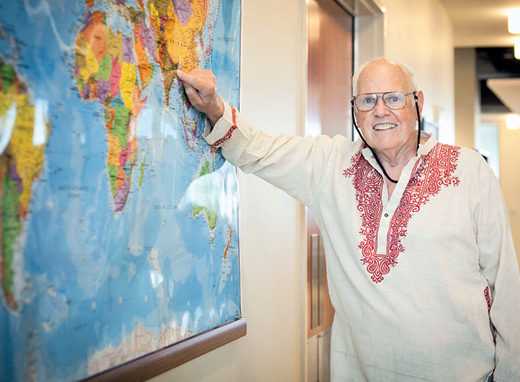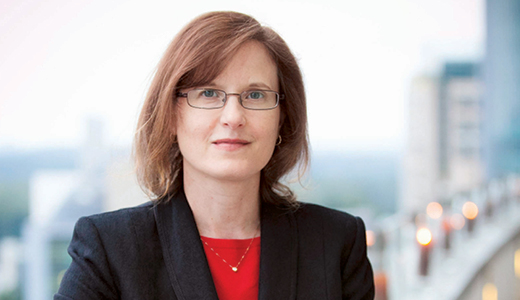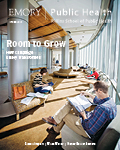Alumni News - Top Honors
The RSPH Alumni Association recognizes a popular global health teacher and a rising star in epilepsy self-management

Stanley O. Foster - Distinguished Achievement Award
Stanley Foster 82MPH has worn his share of colorful shirts and comfortable sneakers during his 50-plus years in global health.
They are familiar trademarks to the legions of Rollins students whom he has taught for nearly 20 years.
Those who take his courses on global health and community building often come away transformed. In his classes, Foster encourages students to think about where they are going and the challenges ahead. One of his students lost five family members during the 1994 genocide in his native Rwanda. Foster's class helped the young man right himself and prepare for the new life chapter before him.
"The thing I've enjoyed most is counseling students," said Foster last fall upon receiving the school's 2012 Distinguished Achievement Award—one of several honors he has received for public health practice and teaching. "The students here are fantastic. I tell them, ‘If you want to make a difference in the world, come to Rollins.'"
Foster too has made a difference. As a young Epidemic Intelligence Service officer at the CDC, he examined thousands of schoolchildren in Arizona for trachoma and investigated other health emergencies, including plague, measles, shigella, kerato conjunctivitis, and rotavirus on behalf of the Indian Health Service. In 1966, Foster was invited to join the CDC's new Smallpox Eradication Program and spent eight years partnering with national health workers in Nigeria, Bangladesh, and Somalia. His efforts helped make history in 1980 by officially eradicating smallpox from the world.
For the next 14 years, Foster worked to improve the health and survival of children in more than a dozen African countries with the International Health Program Office at the CDC. Through his work with the Combating Childhood Communicable Disease Project, he focused on prevention; case management of priority illnesses such as malaria, pneumonia, and diarrhea; and strengthening preventive and curative systems.
In 1994, after serving more than 30 years at the CDC, Foster began his second career at Rollins, where he has taught and mentored students in the classroom and community health workers around the world. Each summer, Foster and his wife, Dottie, travel to the highlands of Guatemala to lead an empowerment workshop for women.
"Everyone wants to have a career like Stan Foster," noted his friend and colleague, former CDC director William Foege, during the RSPH Alumni Awards ceremony. "His family is the world."—Pam Auchmutey
Rosemarie Kobau — Matthew Lee Girvin Award
Rosemarie Kobau 86Ox 88C 00MPH regards Atticus Haygood as a source of inspiration.
Haygood, who served as president of Emory from 1875 to 1884, had epilepsy as a child.
At the CDC, Kobau works to make life better for the 2 million Americans who have epilepsy, efforts for which she received the 2012 Matthew Lee Girvin Award for outstanding young professionals. Girvin, a 1994 alumnus, died in a helicopter crash in 2001 while on a U.N. surveying mission in Mongolia.
When Kobau joined the CDC as a research fellow in 2000, she worked on quality of life research and the agency's new epilepsy program. Two years later, she became a public health adviser and acting team lead of the Health-Related Quality of Life Program. She then set to work on broadening epilepsy research to understand how people with epilepsy cope with the disorder in their daily lives.
Drawing on the success of programs to improve quality of life for people with chronic diseases, Kobau lobbied for the CDC Epilepsy Program to fund research related to epilepsy self-management. Today, the federal agency funds three national self-management programs, and three more are being tested.
Kobau also created the Managing Epilepsy Well (MEW) Network to bring researchers, community groups, and others together to explore ways to help people with epilepsy live well. Emory and five other universities belong to the network. The Emory Research Prevention Center at Rollins coordinates MEW and involves researchers Nancy Thompson, Cam Escoffery, and Colleen DiIorio, professor emeritus and mentor to Kobau.
"Rosemarie has worked tirelessly to broaden epilepsy research beyond cause and cures," said DiIorio during the alumni award ceremony. "There is growing interest in behavioral research and epilepsy because of her efforts."
As Kobau recounted, Atticus Haygood prayed as a child that his epileptic seizures would stop. They did so when he was a teenager.
"He would be proud to know that Emory is at the forefront of improving quality of life for people with epilepsy," she said.—Pam Auchmutey


